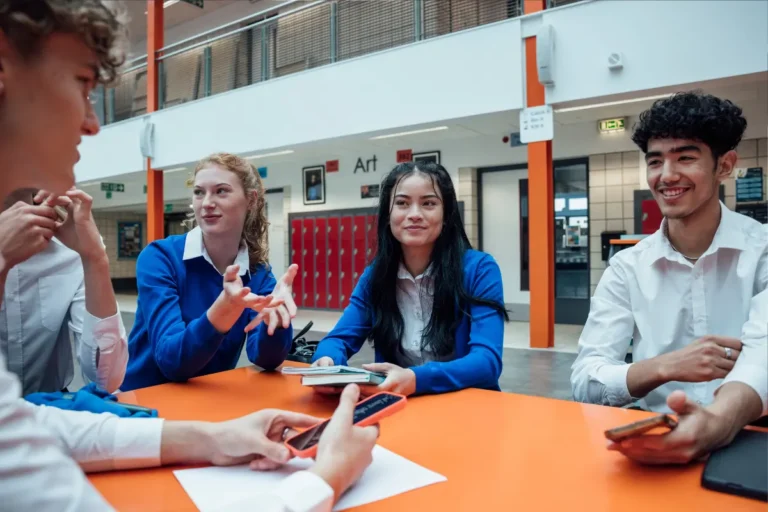Duties of a Student Paragraph in English
Duties of a student paragraph: Students carry the future in their backpacks, laden not just with books but responsibilities. Their primary role transcends mere learning; it involves shaping character and nurturing curiosity. In this paragraph, we will explore these multifaceted duties that prepare students for life beyond the classroom. Stay tuned.
In this article, we have provided 100, 150, and 200-word duties of a student paragraph topic.
Duties of a Student Paragraph 100 Words
Sample-01
Students, as young scholars, have a variety of duties that extend far beyond homework. Chief among these is the pursuit of knowledge, not just through books but through observation and inquiry. Students should actively participate in class, asking questions and engaging with their peers to broaden their understanding. Moreover, respect for teachers and classmates fosters a positive learning environment. Staying organized, completing assignments on time, and preparing for exams are also crucial. Additionally, students should take responsibility for their actions and learn from their mistakes, which is essential for personal growth. Cultivating these habits lays the foundation for a lifetime of learning and success.
Sample-02
A student’s role involves more than just attending school; it’s about being an active member of the educational community. This means participating in school activities, which enhances team spirit and develops leadership skills. Respect for school property, like books and equipment, is imperative, teaching responsibility towards shared resources. Students should also abide by school rules, which helps maintain discipline and ensures everyone’s safety. Being punctual and wearing the school uniform properly is part of showing commitment to one’s educational journey. Additionally, students should strive to be kind and helpful to everyone, promoting an atmosphere of friendliness and cooperation that enriches their educational experience.
Sample-03
Within the school walls, students are not only learners but also contributors to the school’s ethos. They should embrace the spirit of curiosity, always eager to delve deeper into subjects that interest them. This includes participating in science fairs, reading beyond the syllabus, and undertaking projects that challenge their understanding. Upholding integrity, students must do their own work and give credit where it’s due, which teaches them the value of honesty. They should also be environmentally conscious, engaging in activities like recycling projects to promote sustainability. Such responsibilities encourage students to become well-rounded individuals who are prepared not only academically but also socially and ethically.
Duties of a Student Paragraph 150 Words
Sample-01
Have you ever considered what makes a student successful? It begins with understanding and fulfilling their responsibilities. A student’s first duty is to acquire knowledge diligently. They should be curious learners, always eager to explore new ideas and deepen their understanding of the world around them. Regular attendance and active participation in class discussions are also crucial, as they enhance learning experiences and build a strong academic foundation. Additionally, students must organize their time effectively, balancing academics with extracurricular activities. This not only prepares them for future challenges but also helps them develop time management skills essential for life. Respecting teachers and peers is another fundamental duty, fostering a positive and collaborative learning environment. By embracing these responsibilities, students not only excel academically but also grow as responsible and thoughtful individuals.
Sample-02
What are the cornerstones of a student’s life? Clearly, it’s not just about studying for exams. Students must also contribute positively to their educational environment. This means maintaining a clean and orderly space, which encourages a productive learning atmosphere for everyone. Being an ambassador of their school’s values and ethos, whether on or off campus, is equally important. This builds their character and reputation, reflecting well on their institution. Moreover, students should actively participate in community service, understanding their role in the larger society and developing empathy and social responsibility. Engaging in such activities helps broaden their perspectives and cultivate a sense of civic duty. Furthermore, staying informed about global events and understanding their implications on local communities is essential. Through these varied roles, students not only enhance their personal development but also contribute to societal well-being.
Sample-03
Did you know that the role of a student extends beyond just personal achievements? Indeed, one of their key duties is to be an innovator and a problem-solver. In today’s rapidly changing world, students are encouraged to embrace technology and innovation to find solutions to complex problems. This involves not only understanding scientific and mathematical concepts but also applying them creatively in real-life scenarios. Another significant duty is to practice environmental stewardship. This includes participating in sustainability initiatives at school, like recycling programs or energy conservation measures. By doing so, students learn the importance of protecting and preserving natural resources for future generations. Additionally, supporting peers, especially those who struggle academically or socially, is crucial. This builds a supportive community where all students can thrive. Through these endeavors, students not only excel in their studies but also play a vital role in shaping a sustainable and inclusive future.
Duties of a Student Paragraph 200 Words
Sample-01
The pursuit of knowledge is a noble path, and students play a pivotal role in this journey. Their primary duty is to imbibe wisdom from their studies. This not only involves mastering textbooks but also cultivating a love for learning beyond the classroom. Engaging with diverse subjects helps in developing a well-rounded personality. Additionally, students are expected to participate in various school activities, which enhances their team spirit and leadership skills. They should also extend their learning to understanding and respecting different cultures, which promotes global awareness. Being organized is another crucial aspect; maintaining a neat workspace and planning their study schedule diligently pave the way for effective learning. Furthermore, students have the responsibility to uphold the values taught at school, like honesty and integrity. These traits are essential for personal growth and building trust with peers and educators.
Respecting teachers and peers is equally important, as it fosters a positive learning environment. Moreover, students should be proactive in seeking knowledge, by asking questions and participating in discussions. This not only deepens understanding but also encourages critical thinking. Lastly, a student’s duty extends to taking care of their health, recognizing that a healthy body harbors a sharp mind. Balancing academics with physical activities is vital for holistic development.
Sample-02
A student’s life is rich with opportunities to prepare for the future. First and foremost, students must strive for academic excellence. This means not only completing homework on time but also striving to understand the deeper concepts discussed in class. This deep dive enriches their intellect and prepares them for complex problem-solving in the future. In addition to academics, being a reliable member of the school community is vital. This involves participating in school events and contributing to projects, which nurtures a sense of belonging and community responsibility. Environmental stewardship is another significant aspect of a student’s duties. They should be active in promoting and practicing sustainability efforts within their school and community, highlighting the importance of preserving our planet for future generations. Furthermore, embracing technology responsibly is crucial, as digital tools are an integral part of modern education.
Students should use these resources to enhance their learning while staying aware of the ethical concerns surrounding digital media. Networking with peers and educators also plays a crucial role in a student’s growth, providing them with valuable connections and insights. This network can offer support, advice, and open doors to new opportunities. Lastly, students should foster resilience by learning from their failures and persevering through challenges.
Sample-03
Embarking on the path of education, a student must embrace a robust set of responsibilities that sculpt them into proactive members of society. Their journey begins with the rigorous acquisition of knowledge, where they delve into subjects, analyzing and synthesizing information to build a solid academic foundation. This educational pursuit should be balanced with ethical behavior; integrity and honesty must guide their actions, ensuring their work is their own and their interactions are sincere.
Students should also prioritize effective communication skills, both written and verbal. These skills are essential for expressing ideas clearly and collaborating effectively with others. Involvement in extracurricular activities offers another dimension of development, teaching them time management and exposing them to new interests and skills. Moreover, students have a duty to be ambassadors of good health, advocating for and practicing a lifestyle that includes proper nutrition, regular exercise, and sufficient rest. Leadership is another area where students can shine; taking initiative in group projects or leading a student organization helps develop leadership skills that are crucial in both academic and professional settings. They must also be empathetic and supportive peers, contributing to an inclusive environment that values each student’s unique background and perspectives.
Conclusion
Students bear the responsibility to enrich their minds and characters. Through diligence and curiosity, they prepare to contribute meaningfully to society. Their role extends beyond academics, embracing the cultivation of ethics and teamwork.
Additionally, they must balance responsibilities and leisure. Successfully managing both is crucial. This ensures a well-rounded development, fostering future success.


